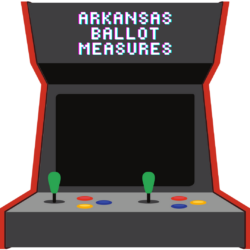
For over 100 years, Arkansans have had the constitutional right to propose and vote on laws and constitutional amendments. But in recent years, the Arkansas General Assembly has repeatedly chipped away at that right, making it harder and harder to pass measures. And this year, they took an ax to ballot measure rights. Voters will have a very different experience when they participate in the petition process this year, and ballot measure campaigns will have to navigate a practically impossible gauntlet to get measures on the ballot. It is not just a game that is stacked against citizen-led campaigns, it is a game they can’t win.
Beginning the Quest

One of the early steps to proposing a citizen ballot measure is to file the proposed ballot measure language with the Attorney General’s office for review. But a couple of new laws increase the power of the Attorney General to block measures from getting to the point where they can collect signatures at all. Act 154 now allows the Attorney General to reject a proposed ballot measure based on whether he or she determines the proposed measure would violate the United States Constitution or federal law. Historically, they have only provided opinions and guidance on the topic.
For instance, when For AR Kids originally filed the Arkansas Educational Rights Amendment in 2024, the group was told by the Attorney General’s office that they believed a portion of the amendment (which aimed to require private schools receiving public funding to follow the same standards as public schools) violated the U.S. Constitution. What the Attorney General’s office provided was only a legal opinion. Under Act 154, the Attorney General has the power to reject an amendment based on his or her claims.
The new law also allows the Attorney General to block “conflicting measures” filed by the same sponsor. Last year, Arkansas Citizens for Transparency circulated two measures, one an initiated act (a law) and one that was a constitutional amendment around government transparency. If Act 154 had been in place at the time, the Attorney General could have blocked whichever measure was filed second.
There are some things that sound good when you first hear about it, like deep dish pizza. But the more you learn, like the cheese-to-crust ratio, you realize it is not really that great after all. Act 602 is the legal equivalent of a deep dish pizza. The law establishes a requirement that the ballot measure title be written at an eighth grade level using the Flesch-Kincaid test, which, at first glance, seems reasonable. But laws are not written at the eighth grade level. Even the simplest phrases cannot meet this requirement. In fact, the phrase, “an amendment to the Arkansas Constitution,” a critical phrase to include in a ballot measure title for a constitutional amendment, ranks over a twelfth grade reading level. And now, the Attorney General can use the Flesch-Kincaid test to prevent ballot measures from moving forward. If you need proof that the measure is an effort to decrease the power of everyday Arkansans, while furthering empowering the legislature, legislatively referred constitutional amendments were not included in this new law. And take note: an amendment the legislature just referred to voters, the “Citizens Only Voting Amendment,” has a title that ranks at the graduate school level.
Leveling Up

What is the longest period of time you would feel comfortable having a stranger read aloud to you while standing a few feet away? Under Act 274, before you can sign a petition, either a canvasser must watch you read the ballot title, or the canvasser must read the ballot title out loud to you. Ballot measure campaigns were already required to have a copy of the ballot title with the signature pages, and voters could already read the title if they chose. This new law will likely be used by opponents of campaigns to try to disqualify signatures and “catch” campaigns when voters don’t appear to spend enough time reviewing the ballot title.
Imagine going about your day, and before everything you do, you’re told about potential illegal activity you might be participating in. For example:
- Get in your car and your car system tells you, “Speeding is illegal.”
- Buy a coffee, and before giving your coffee to you the barista says, “Did you know stealing is illegal?”
- Checking out at the grocery store, and a store employee says, “Before I can hand you these, did you know credit card fraud is illegal?”
You’d probably be on edge and avoid some activities all together. Act 218 requires canvassers to tell potential signers that petition fraud is a crime before they can let them sign. Common sense says most, if not all Arkansas voters, are already aware that fraud is illegal. At the mention of fraud, some legitimate potential signers will be scared away from participating, afraid that if they don’t do everything just right, they might be committing a crime.
After reading out loud to you and scaring you about fraud, Act 240 requires that canvassers check your photo ID to confirm that you are who you say you are. If you have stuck around this long, you have likely leaned into the discomfort of the new petition process. But again, this step is another barrier to participation. How many people would feel comfortable handing their ID to a stranger on the street?
These policies add up to a time-consuming and intrusive process that is going to keep voters away from signing.
Boss Level

“Two wrongs don’t make a right” is a common refrain. But a new law, Act 273, will compound harm by punishing Arkansans for the wrongdoing of a canvasser. The law requires the Secretary of State to throw out all signatures, regardless of whether the signatures are legitimate, if the Secretary of State’s office finds there is a preponderance of the evidence (meaning more likely than not) that the canvasser who collected the signatures broke the law (like not reading the full ballot title out loud). If the goal of the law were to ensure that all signatures were collected pursuant to the law, then only those believed to have been collected illegally should be removed. But a canvasser’s mistake one morning with one voter could result in hundreds of signatures being tossed.
Act 241 requires canvassers to file an affidavit with the Secretary of State’s office before the signatures they collected can be counted. It also prevents canvassers from collecting additional signatures after a campaign has submitted signatures to the Secretary of State’s office, until the office determines the campaign met certain requirements. This is an effort to block campaigns from collecting signatures that could be used in what is known as the “cure period,” in which campaigns are allowed to collect additional signatures for one month if the Secretary of State finds that they have collected at least 70% of the required signatures by the signature collection deadline. Again, this law is another wrench thrown at campaigns to prevent their success.
Black Mirror

The many new restrictions to the citizen ballot measure process, compounded with many other laws recently passed by the state legislature, make it virtually impossible for any citizen-led campaign to be successful. Unable to repeal the process altogether, the legislature has thrown up nearly every obstacle to prevent citizens from voting for laws that most Arkansans support, but that the General Assembly does not.
Advocacy works!

The ballot measure landscape is certainly bleak. But the advocacy of individuals and nonprofits at the state Capitol did make a difference in blocking even more harmful legislation from passing. While bad bill after bad bill were debated in the General Assembly, citizens from across the political spectrum — and with very divergent policy beliefs — pushed back against efforts to restrict the ballot measure process. Their advocacy helped successfully block a bill (SB434) that would have required ballot measures to receive approval from a majority of registered voters, not a majority of people who voted. Another bill (HB1714) that failed would have prevented volunteer canvassers from receiving reimbursement for milage or meals. There was also an attempt (SB212) to create a law enforcement agency within the Secretary of State’s office that would be tasked with reviewing documents, subpoenaing witnesses, collecting evidence, and more related to elections generally and ballot measures specifically. And perhaps the most harmful bill that was blocked (SB569) would have tried to overturn a decades-old ruling by the Arkansas Supreme Court that stated that the General Assembly cannot amend Constitutional Amendments that were citizen-initiated.
Even when the tide is against you, advocacy can make a difference. And the ballot measure process is critical to fight for. Without the process we wouldn’t have some of the popular policies that improve the lives of people in our state, like a higher minimum wage, because it would never have passed in the General Assembly. Arkansas families deserve a say in decisions impacting their lives. And when the Arkansas Legislature won’t represent the will of the people, Arkansans have the constitutional right to pass the law themselves. After all, in Arkansas, Regnant Populus – the People Rule.
